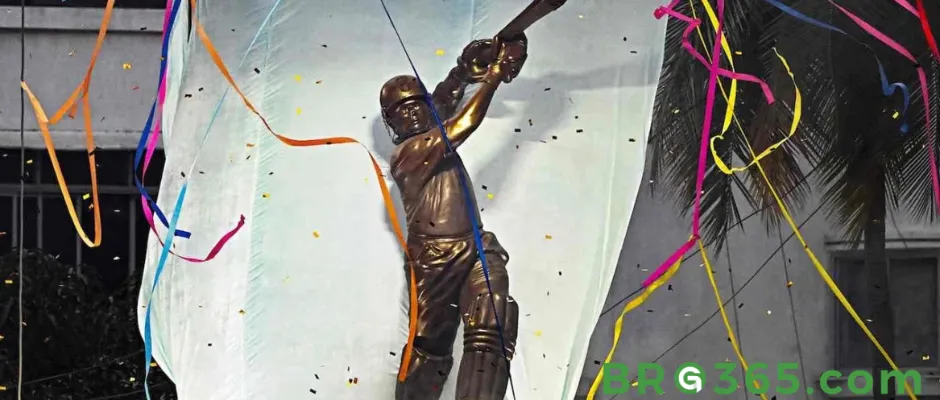At Mumbai's Wankhede Stadium, the Sachin Tendulkar Statue stands as a revered icon, blending cricket with spiritual devotion.
Fans partake in rituals akin to religious ceremonies, honoring the legend's legacy.
For more insights into this unique fusion of sport and faith, visit BRG365.
Iconic Landmarks at Wankhede
Mumbai’s Wankhede Stadium, the beating heart of Indian cricket, now hosts two iconic landmarks that encapsulate the city’s cricketing soul: the Sachin Tendulkar Statue and the MI Trophy Sculpture.
These installations, unveiled in 2013 and 2023 respectively, celebrate individual brilliance and collective triumphs, reflecting India’s deep-rooted cricket culture.
Sachin Tendulkar: Immortalized

Unveiled on November 1, 2023, the Sachin Tendulkar Statue is a tribute to his unparalleled legacy.
Crafted by artist Pramod Kamble, it captures the “Master Blaster” in his signature mid-lofted drive.
Strategically placed near the Sachin Tendulkar Stand, the statue commemorates his 2011 World Cup win and his 2013 farewell Test, moments that defined cricketing history.
The inauguration, attended by dignitaries like Maharashtra’s Chief Minister and BCCI officials, drew global attention.
Tendulkar described the statue as a “full-circle moment,” acknowledging Wankhede’s role in his transition from prodigy to legend.
This Sachin Tendulkar Statue joins his wax figure at Madame Tussauds, further solidifying his status as India’s first sportsman to achieve such recognition.
Fan Rituals
Just steps away from the Sachin Tendulkar Statue stands the MI Trophy Sculpture, a replica of Mumbai Indians' 2013 IPL trophy.
Erected to commemorate MI’s first IPL victory, this sculpture has become a pilgrimage site for fans.
Touching the sculpture is believed to channel “victory luck,” blending India’s cricket fandom with religious devotion.
Since its relocation to a larger fan plaza in 2023, the sculpture has become an iconic landmark in Mumbai.
Fans queue to touch it, following traditions of blessing sacred objects.
The ritual, tied to MI’s “lucky number 16” (the team’s 16th IPL season win), has inspired tattoos and viral social media campaigns like #TouchForMI.
Tradition Meets Modernity
Both the Sachin Tendulkar Statue and MI’s Trophy Sculpture reflect Mumbai’s unique cricketing ethos:
-
Religious Undertones: The Sachin Tendulkar Statue is treated by fans as a hero's shrine. His 2011 World Cup victory is often referred to as a “sacred mission.”
-
Meanwhile, the MI sculpture’s touch ritual mirrors temple pilgrimages, with fans believing it brings good fortune to the team.
- z
-
Collective Memory: The statue anchors Tendulkar’s individual legacy, while the MI sculpture symbolizes the team’s underdog journey.
-
Both landmarks host annual events, like the 16-minute phone light tribute to MI’s 2013 win, helping to foster a shared identity among fans.
-
Global Recognition: International media outlets like AFP and ESPNcricinfo covered the unveiling of the Sachin Tendulkar Statue, while the MI sculpture’s LED touch-activated displays have gone viral across the globe.
-
This contrast between Tendulkar’s individual glory and MI’s team-oriented symbol highlights cricket as both a personal and collective experience.
The Future of Mumbai’s Heritage
As Mumbai readies for IPL 2025, both the Sachin Tendulkar Statue and the MI Trophy Sculpture continue to evolve.
The MI sculpture now features pressure sensors that light up “16” when touched, blending tradition with modern technology.
Meanwhile, Tendulkar’s statue has become a popular backdrop for fan meetups and corporate events, further highlighting cricket’s commercial and cultural significance.
Both installations serve as reminders that cricket in India is more than just a sport—it’s a religion, a language, and a unifying force.
From Tendulkar’s historic career to MI’s trophy rituals, these landmarks ensure that the legacy of cricket remains alive while shaping the future of the game.
